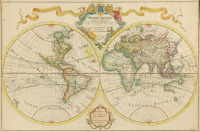Chapter 45: 448-451
Contents
Page 449
Monsieur Vaucanson
See page 372.
Haute Monde
pun on High World, which usually means High Society
Cher-i-e
Darling
Page 450
Monsieur Delisle's Mappe-mondeSee page 213.
Father Boscovich
See page 215.
Académie
French Academy of Sciences, see page 373.
Syllogism
A syllogism (Greek: συλλογισμός – "conclusion," "inference") or logical appeal is a kind of logical argument in which one proposition (the conclusion) is inferred from two others (the premises) of a certain form. In Aristotle's Prior Analytics, he defines syllogism as "a discourse in which, certain things having been supposed, something different from the things' supposed results of necessity because these things are so." (24b18–20) From WIKI
Page 451
Great Thieves of Whitehall
The name Whitehall is often used as a metonym to refer to the government of the United Kingdom or senior ministers (such as the prime minister and other cabinet members), in the same way the Kremlin refers to the Russian/Soviet governments, or White House refers to the executive branch of the government of the United States. From WIKI
Whitechapel
By the late 16th century the suburb of Whitechapel and the surrounding area had started becoming 'the other half' of London. Located east of Aldgate, outside the City Walls and beyond official controls, it attracted the less fragrant activities of the city, particularly tanneries, breweries, foundries (including the Whitechapel Bell Foundry which later cast Philadelphia's Liberty Bell and London's Big Ben) and slaughterhouses... Population shifts from rural areas to London from the 17th century to the mid 19th century resulted in great numbers of more or less destitute people taking up residence amidst the industries and mercantile interests that had attracted them. From WIKI
the Great Motrices
the Great Motor
Motor - From 15c. as "controller, prime mover" (in reference to God); sense of "agent or force that produces mechanical motion" is first recorded 1664 - From link title OED
Let Antony lose the world for Cleopatra
Cleopatra VII Philopator (in Greek, Κλεοπάτρα Φιλοπάτωρ; October 69 BC – August 12, 30 BC) was the last effective pharaoh of Egypt's Ptolemaic dynasty. She originally shared power with her father Ptolemy XII and later with her brothers Ptolemy XIII and Ptolemy XIV, whom she also married, but eventually gained sole rule. As pharaoh, she consummated a liaison with Gaius Julius Caesar that solidified her grip on the throne. She later elevated her son with Caesar, Caesarion, to co-ruler in name. After Caesar's assassination in 44 BC, she aligned with Mark Antony in opposition to Caesar's legal heir Gaius Julius Caesar Octavian, later known as Augustus. With Antony she bore a set of twins, Cleopatra Selene II and Alexander Helios, and another son, Ptolemy Philadelphus. Her successive unions with her brothers produced no children. After losing the Battle of Actium to Octavian's forces, Antony committed suicide. Cleopatra soon followed suit, according to tradition killing herself by means of an asp bite on August 12, 30 BC. She was briefly outlived by Caesarion, who was declared pharaoh, but he was soon killed on Octavian's orders. Egypt became the Roman province of Aegyptus. From WIKI
